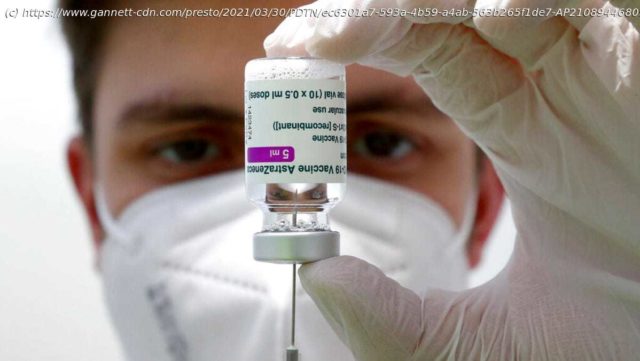In a statement released Wednesday, the European Medicines Agency placed no new restrictions on using the vaccine in people 18 and older, saying benefits outweigh risks
London — The EU’s drug regulator says it has found a “possible link” between the AstraZeneca coronavirus vaccine and a rare clotting disorder but said that the benefits of the shot still outweigh risks. In a statement released Wednesday, the European Medicines Agency placed no new restrictions on using the vaccine in people 18 and over. Earlier this week, a senior official from the European Medicines Agency said there was a causal link between the AstraZeneca vaccine and the rare clots that have been seen in dozens of people worldwide, among the tens of millions who have received at least one dose of the shot. Marco Cavaleri, head of health threats and vaccine strategy at the Amsterdam-based agency, said in comments to Rome’s Il Messaggero newspaper on Tuesday that “it is becoming more and more difficult to affirm that there isn’t a cause-and-effect relationship between AstraZeneca vaccines and the very rare cases of blood clots associated with a low level of platelets.” But Cavaleri acknowledged the agency hadn’t yet figured out how exactly the vaccine might be causing these rare side effects. The agency said its evaluation “has not yet reached a conclusion and the review is currently ongoing.” The EMA is particularly focused on two types of rare blood clots: one that appears in multiple blood vessels and another that occurs in a vein that drains blood from the brain. It is also evaluating reports of people who had low levels of blood platelets, which puts them at risk of severe bleeding. The EMA, the World Health Organization and numerous other health authorities have said repeatedly that the AstraZeneca vaccine is safe and effective and that the protection it offers against COVID-19 outweighs the small risks of rare blood clots. As recently as last week, the EMA said “there is no evidence that would support restricting the use of this vaccine in any population” — a response to several countries doing just that — though an expert said more brain clots were being reported than would be expected. To date, most of the cases have been reported in younger women, who are more susceptible to developing such rare clots anyway, making understanding what is causing the clots potentially more difficult.






